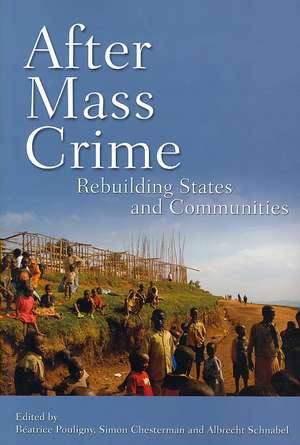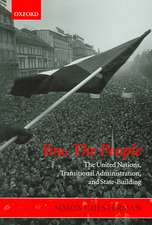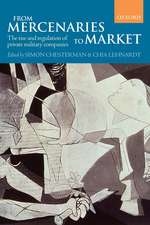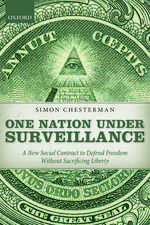After Mass Crime: Rebuilding States and Communities
Editat de Béatrice Pouligny, Simon Chesterman, Albrecht Schnabelen Limba Engleză Paperback – 12 iun 2007
International interventions in the aftermath of mass violence tend to focus on justice and reconciliation processes, elections, and institution-building. The frame of reference is at the state level, although the experience of crime by a population is also at the level of the community and individuals. Insufficient attention has been paid to the radical transformations in community and individual belief systems and codes of conduct after the experience of mass crime. This book seeks to bridge the divide by offering a transdisciplinary analysis of the impact of mass crime on the rebuilding of social and political relations. Drawing on historical and more recent cases—including examples from Bosnia- Herzegovina, Burundi, Cambodia, Indonesia, Peru, and Rwanda—the authors examine the impact of mass crimes on individuals, society at large, and the organizations involved in providing assistance in the post-conflict phase. While outside actors have a role to play in this difficult process, the hardest work must be done by those picking up the pieces of a community that has turned on itself.
Preț: 315.57 lei
Nou
Puncte Express: 473
Preț estimativ în valută:
60.39€ • 61.85$ • 50.24£
60.39€ • 61.85$ • 50.24£
Carte tipărită la comandă
Livrare economică 19 martie-02 aprilie
Preluare comenzi: 021 569.72.76
Specificații
ISBN-13: 9789280811384
ISBN-10: 928081138X
Pagini: 340
Dimensiuni: 152 x 229 x 18 mm
Greutate: 0.52 kg
Editura: Brookings Institution Press
Colecția United Nations University Press
ISBN-10: 928081138X
Pagini: 340
Dimensiuni: 152 x 229 x 18 mm
Greutate: 0.52 kg
Editura: Brookings Institution Press
Colecția United Nations University Press
Notă biografică
Béatrice Pouligny is senior researcher at the Centre for International Studies and Research (CERI/Sciences-Po), Paris. Simon Chesterman is global professor and director of the New York University School of Law Singapore Program, Singapore. Albrecht Schnabel is a senior research fellow at swisspeace;Swiss Peace Foundation, Bern, Switzerland.
Descriere
International interventions in the aftermath of mass violence tend to focus on justice and reconciliation processes, elections, and institution-building. The frame of reference is at the state level, although the experience of crime by a population is also at the level of the community and individuals. Insufficient attention has been paid to the radical transformations in community and individual belief systems and codes of conduct after the experience of mass crime. This book seeks to bridge the divide by offering a transdisciplinary analysis of the impact of mass crime on the rebuilding of social and political relations. Drawing on historical and more recent cases—including examples from Bosnia- Herzegovina, Burundi, Cambodia, Indonesia, Peru, and Rwanda—the authors examine the impact of mass crimes on individuals, society at large, and the organizations involved in providing assistance in the post-conflict phase. While outside actors have a role to play in this difficult process, the hardest work must be done by those picking up the pieces of a community that has turned on itself.













